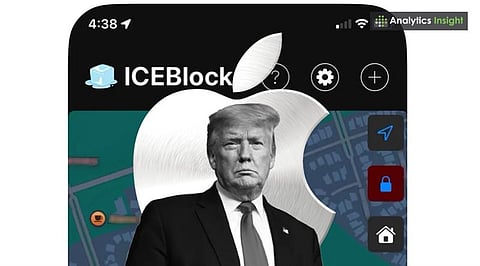

Apple removes ICEBlock app under Trump-era pressure, sparking debate on privacy and civil liberties.
Apple has removed a few immigration tracking apps, including the popular ICEBlock, from its App Store. The tech giant has literally been forced to take this decision amid intense pressure from the Trump administration, as reported by Hindustan Times. The action has rekindled controversies around digital privacy, government surveillance, and the role of tech companies.
ICEBlock, which had active users numbering in hundreds of thousands, enabled individuals to report anonymously the presence of Immigration and Customs Enforcement (ICE) agents within a five-mile range. Designed in a similar vein to navigation apps such as Waze that warn motorists about police presence, ICEBlock was marketed as a community safety device by its developer. The app gained traction through offering instantaneous alerts and creating a collective defense perception among immigrant communities.
The Trump government saw the app posing a possible risk to federal functions. Officially, warnings were sent under law to ICEBlock's developer, Joshua Aaron, and media organizations reporting on the app.
The Secretary of Homeland Security, Kristi Noem, proposed that releasing information about such tools could be tantamount to inciting individuals to evade law enforcement. Attorney General Pam Bondi also cautioned Aaron to ‘watch out,’ marking a new tougher approach against apps that have the potential to tamper with immigration enforcement.
Apple has confirmed that the company was contacted by law enforcement authorities. Although it did not identify which authorities contacted them. The tech giant explained that it decided to remove immigration apps in response to concerns about legality and compliance. Hence, highlights the thin line on which it walks between freedom of users and the regulatory authorities.
Joshua Aaron, the Texas-based developer of ICEBlock, has come out in defense of his project, contending that it qualifies for free speech protections. He likened ICEBlock's functionality to common navigation applications available to users who warn motorists about speed traps and road dangers.
Aaron asserted government overreach and characterized the situation as a battle against authoritarian impulses. "If you resist a regime that claims authoritarianism, undermining the Constitution, you have to be aware they're going to get at you in some form," he said.
Apple ICEBlock removal hints at the overlap between users’ digital privacy rights, government’s authority, and tech companies’ compliance needs. With the dispute intensifying, Apple's action may set a standard for how future confrontations over civil liberties and government might unfold in an online, mediated environment. With privacy, activism, and internet rights at stake, the removal of ICEBlock could be seen as a key moment in the conflict between technology and liberty.
Also Read: Trump’s 100% Tariff Threat on Chips: Apple, AMD, Nvidia Sound Alarm
